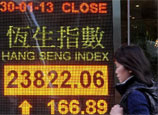
However, he ruled out the possibility that violent acts will lead the Egyptian economy to collapse.
Mohamed Abdel Aziz, a professor of accounting and funding at the American University in Cairo, believed that the government could solve the economic crisis like rationalizing expenditure and increasing the taxes over people with high incomes.
Aziz reiterated that the most dangerous results of ongoing violence will be seen in the currency exchange, adding that "the Egyptian pound will decline more," which was related with the slow influx of foreign currencies from tourism, investments and Suez canal revenues due to the instability."
He added the continuous depreciation of the Egyptian pound against the U.S. dollar will increase the budget deficit, explaining that half of the budget is targeting the subsidies and the public debt.
The tourism sector has been hit hard by the current wave of violence across Egypt, with hotel occupancy rates hitting a record low.
Ehab al-Desouki, chief of Economic Studies Center in Sadat Academy, said the recent clashes would make the International Monetary Fund (IMF) postpone negotiations about a loan of 4.8 billion U.S. dollars to Egypt, because the chaos in the country will definitely influence the investment environment.
Shokry urged all political parties to work on achieving stability, or "no international funding authority will respond to Egyptians' demands."
"Restoring confidence of investors and citizens is key to the economic revival," he added.

















 Spring Festival travel rush continues
Spring Festival travel rush continues


![]()
